Donald Trump tells impeachment jokes at annual turkey pardon event
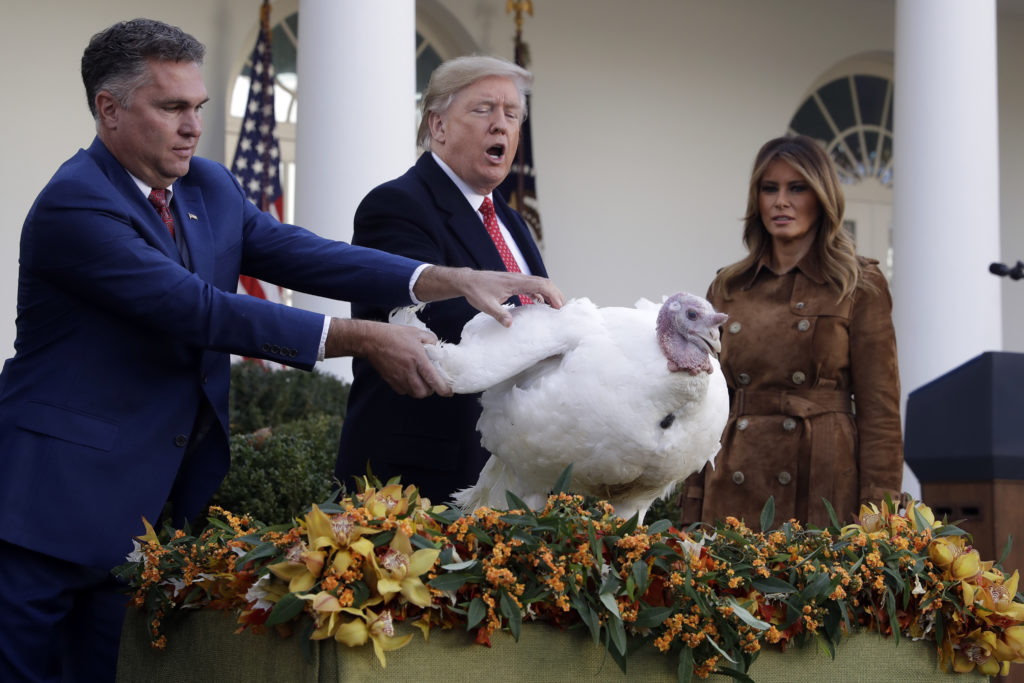
President Donald Trump couldn’t resist riffing on the House impeachment inquiry Tuesday as he continued the tradition of pardoning a Thanksgiving turkey, generating holiday-season laughter at the expense of House Intelligence Committee Chairman Rep. Adam Schiff, one of his chief antagonists in Congress. Trump joked that the pair of North Carolina-bred turkeys he was about to pardon had been raised to “remain calm under any condition,” a trait that he said will be “very important because they’ve already received subpoenas to appear in Adam Schiff’s basement on Thursday.” “It seems the Democrats are accusing me of being too soft on turkey,” Trump told guests seated in the White House Rose Garden, where he was flanked by his wife, first lady Melania Trump. But he told the turkeys that, “unlike previous witnesses, you and I have actually met. It’s very unusual.” Trump’s Republican defenders in Congress had criticized Schiff for holding closed-depositions in a secure room in the basement of the Capitol Visitor Center, which Democrats said was necessary for the investigation. Trump has criticized the impeachment inquiry as both a “scam” and a “hoax.” Trump also has claimed to barely know some of the witnesses – including Gordon Sondland, Trump’s ambassador to the European Union – who testified during public impeachment hearings chaired by Schiff, a California Democrat. Testimony from several officials showed that Sondland had been in frequent contact with Trump around the time Trump spoke with the president of Ukraine about doing a politically beneficial “favor.” Schiff is leading the House impeachment inquiry for his committee. Meanwhile, as the White House ceremony was about to begin, the House Judiciary Committee announced it has scheduled an impeachment hearing for Dec. 4, when Trump is expected to be in London for a NATO conference. Trump’s latest act of clemency benefited Butter, a 47-pound (21-kilogram) turkey granted a “full and complete” pardon. Trump said he was also sparing Butter’s alternate, named Bread, who weighs 45 pounds (20 kilograms) from being served up on a Thanksgiving table. Both gobblers will get to spend the rest of their lives on a farm at Virginia Tech in Blacksburg, Virginia. Turning serious, Trump gave thanks for the “newfound prosperity and spirit” that he said is taking hold across the country and predicted “it’s going to be a great Thanksgiving.” He also expressed gratitude for U.S. service members who will spend the holiday stationed in hot spots around the world. President George H.W. Bush established the annual turkey pardon tradition in 1989 by sparing a 50-pound (23-kilogram) bird. By Darlene Superville Associated Press. Follow Darlene Superville on Twitter: http://www.twitter.com/dsupervilleap Republished with the Permission of the Associated Press.
Gulf Coast ports fear tariffs could reduce ship traffic and jobs
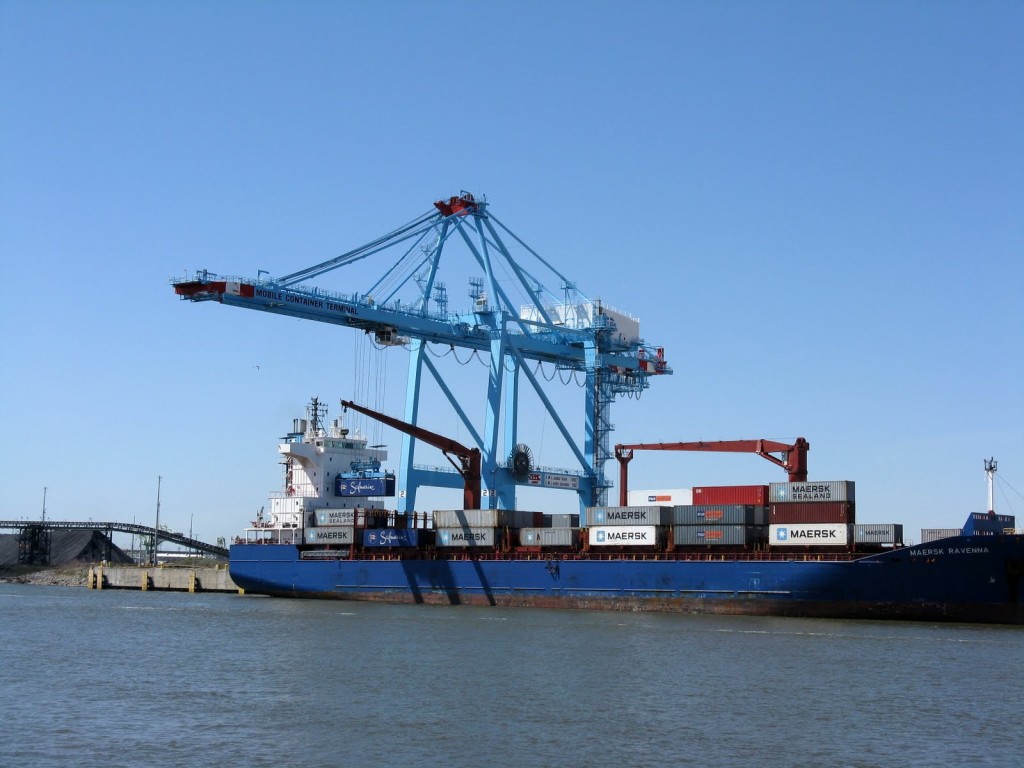
Ports and ground terminals in nearly every state handle goods that are now or will likely soon be covered by import tariffs. Port executives worry that this could mean a slowdown in shipping that would have ripple effects on truckers and others whose jobs depend on trade. The Associated Press analyzed government data and found that from the West Coast to the Great Lakes and the Gulf of Mexico, at least 10 percent of imports at many ports could face new tariffs if President Donald Trump’s proposals take full effect. Since March, the U.S. has applied new tariffs of up to 25 percent on nearly $85 billion worth of steel and aluminum and various Chinese products, mostly goods used in manufacturing. Trump said in a recent tweet, “Tariffs are working big time.” He has argued that the tariffs will help protect American workers and force U.S. trading partners to change rules that the president insists are unfair to the United States. In New Orleans, port officials say a tariff-related drop in shipments is real, not merely a forecast. Steel imports there have declined more than 25 percent from a year ago, according to the port’s chief commercial officer, Robert Landry. The port is scouting for other commodities it can import. But expectations appear to be low. “In our business, steel is the ideal commodity,” Landry said. “It’s big, it’s heavy, we charge by the ton so it pays well. You never find anything that pays as well as steel does.” The port of Milwaukee imports steel from Europe and ships out agricultural products from the Midwest. Steel imports haven’t dropped yet because they are under long-term contracts, said the port director, Adam Schlicht. But there has been “an almost immediate halt” in outbound shipments of corn because of retaliatory duties imposed by the European Union on American products. Much of the corn, he said, “is just staying in silos. They are filled to the brim.” Many other ports have been humming along and even enjoyed an unexpected bump in imports during June and July as U.S. businesses moved up orders to ship before the new tariffs took effect. That started with manufacturing goods and is now spreading to retail items for back-to-school and Christmas. “Some of my retail customers are forward-shipping the best they can to offset proposed tariffs,” says Peter Schneider, executive vice president of T.G.S. Transportation, a trucking company in Fresno, California. Port officials were encouraged by this week’s announcement that the United States and Mexico had reached a preliminary agreement to replace the North American Free Trade Agreement, hoping it might lead to reduced trade barriers. Canada’s participation in any new deal to replace NAFTA, though, remains a major question mark. The port officials continue to worry, though, that Trump will make good on a plan to expand tariffs to an additional $200 billion in Chinese imports — a list that includes fish and other foods, furniture, carpets, tires, rain jackets and hundreds of additional items. Tariffs would make those items costlier in the United States. And if Americans buy fewer of those goods, it would likely lead to fewer container ships steaming into U.S. ports. The impact will be felt keenly at West Coast ports like Los Angeles and Long Beach. Los Angeles Mayor Eric Garcetti, relying on information from his port officials, said his port — the biggest in the United States — could suffer a 20 percent drop in volume if the additional $200 billion in tariffs are imposed against Chinese goods. Jock O’Connell, an economist in California who studies trade, said he doubts a downturn would be so severe — that would match the slump that accompanied the global recession of 2008 — “but we will see a definite impact.” Here are some of the key findings from the AP analysis: — U.S. tariffs will cover goods that are imported at more than 250 seaports, airports and ground terminals in 48 states. — At 18 of 43 customs districts — including those representing ports around Los Angeles, San Francisco, New Orleans and Houston — at least 10 percent of their total import value could be covered by new tariffs if all Trump’s proposals take effect. — Retaliatory duties by China and other countries cover $27 billion in U.S. exports. Eugene Seroka, executive director of the Los Angeles port, worries that “if tariffs make it too expensive to import, there will be an impact on jobs.” Seroka and others don’t expect layoffs on the docks. Union longshoremen — whose average pay last year on the West Coast was $163,000, according to the Pacific Maritime Association, which negotiates for the ports — often have contract provisions ensuring that they are paid even if there’s no work. And there are fewer of them than there were a few decades ago because the advent of shipping containers has reduced the need for people on the docks. Dwayne Boudreaux, an International Longshoremen’s Association official in Louisiana, said, though, that his stevedores are handling about 10 percent less steel from Japan because of the new tariffs. “We don’t think it’s going to (get) worse,” he said. But, he added, “who knows — that could change from the next press conference.” The impact might be greater on truck drivers and warehouse workers. Fewer will be needed, according to O’Connell. Many drivers who deliver shipping containers from the dock to warehouses are independents contracted by trucking companies, and they don’t get paid if there is nothing to haul. Some might leave the profession, said Weston LaBar, CEO of the Harbor Trucking Association in Long Beach, California. “It’s hard to retain drivers,” he said. “If we don’t have work for those drivers, we’re worried they will leave for some other segment of the trucking business or go into another business, like construction.” Less shipping means less revenue for the ports — something that could limit their ability to pay for expansion and improvement projects, according to Kurt Nagle, president of the
New study reveals Alabama has 5th highest incarceration rate in the world
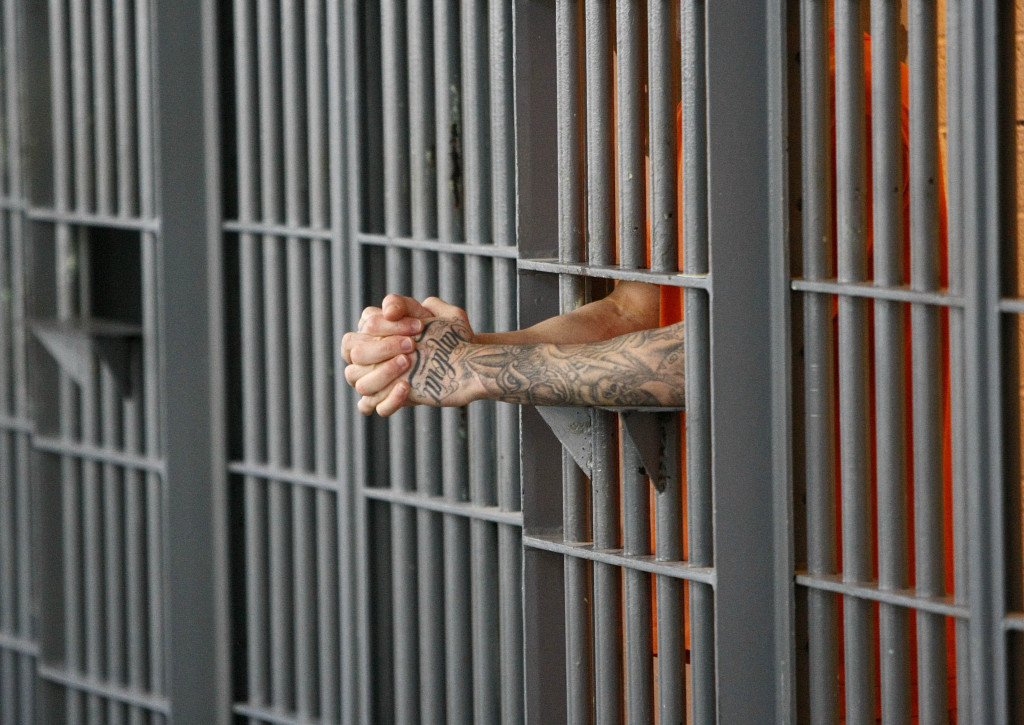
The Prison Policy Initiative released a new report in May comparing the incarceration rate of each American state to countries around the world, and the Yellowhammer state came in fifth place overall. Fifth place, compared to the entire world; yikes Alabama. Oklahoma topped the list with 1,079 inmates per 100,000 of populous in their state but Alabama was not far behind, reporting 946 people imprisoned per 100,000 people in the state; the U.S. national average is 698 per 100,000. But the Yellowhammer state was not the only one with higher ratings, a total 23 states in the nation were reported to have rates over the national average, giving them the highest incarceration rates in the world. The report then compared these numbers to other nations around the world, where even places like Slovakia, Argentina, Australia and the Ukraine had less than 200 people per 100,000 incarcerated. “If we imagine every state as an independent nation…every state appears extreme,” said the report. “Massachusetts, the state with the lowest incarceration rate in the nation, would rank 9th in the world, just below Brazil and followed closely by countries like Belarus, Turkey, Iran, and South Africa.” “States like Alabama, with incarceration rates even higher than the U.S. average, compare even worse. Next to other stable democracies, Alabama is off the charts,” the Prison Policy Initiative explained. The prison system in Alabama is long overdue for an overhaul, the state prison system houses nearly twice the inmates it was designed for. Prison officers and inmates have been killed and injured in a series of violent crimes behind bars, and with several reports this year of Sheriff’s stealing and pocketing hundreds of thousands of dollars meant for inmates food rations, it’s a wonder we’re not talking about this issue. In 2014, the Southern Poverty Law Center (SPLC) and the Alabama Disabilities Advocacy Program filed a lawsuit against the Alabama Department of Corrections (ADOC) to end the poor conditions in the state prison system, including the understaffing of both correctional and mental health workers. According to the SPLC, as of January 2018, the state still hadn’t come up with an acceptable remedy to address the “horrendously inadequate” and unconstitutional mental health care and staffing needs of the ADOC. “As Gov. Kay Ivey and ADOC Commissioner Jeff Dunn have both recognized, the constitutional violations of how the state treats prisoners developed over a generation. It will be difficult, and likely costly, to fix them. But ADOC has to fix them,” said Maria Morris, senior supervising attorney for the SPLC, and lead litigator in the case. Ivey responded by adding an additional $51 million to the ADOC budget earlier in 2018.
Congressional Democrats take Donald Trump to court over foreign favors

Lawyers representing nearly 200 Democrats in Congress plan to argue in federal court Thursday that President Donald Trump is violating the Constitution by accepting foreign state favors without first seeking congressional approval. The case argues that the president has received foreign government favors, such as Chinese government trademarks for his companies, payments for hotel room stays and event space rentals by representatives of Saudi Arabia and Kuwait, and proceeds from Chinese or Emirati-linked government purchases of office space in Trump Tower. Ethics experts say the constitutional emoluments clause was created by the Founding Fathers to ensure that government officials act with the interests of the American public in mind instead of their own pocketbooks. Since then, it has been applied to the lowest of government of officials up to the president without a court challenge. “This argument on Thursday will essentially put to the test the proposition that no one is above the law, not even the president,” said Sen. Richard Blumenthal, a Connecticut Democrat who is leading the effort. “He’s thumbed his nose at the plain text and in doing so he’s thumbed his nose at the American people.” Unlike prior presidents, Trump chose not to divest from his assets and he remains the owner of the Trump Organization, a sprawling business empire with 550 entities in more than 20 countries that include branded hotels, golf courses, licensing deals and other interests. His Washington, D.C., hotel just steps from the White House has become a magnet for foreign governments, including groups tied to Kuwait, Bahrain, Turkey, Malaysia and Saudi Arabia. The District of Columbia case is one of three that argues the president is violating the emoluments clause, which bans accepting benefits from foreign governments unless a majority of both houses of Congress consent. But Thursday’s case is different in that the plaintiffs in the suit — members of Congress — are mentioned in the clause itself, and they believe that Congress not only has a right but is required, as part of their jobs, to weigh in on potential emoluments such as a $6.5 million condo purchase by the Qatari government or a Chinese-government owned company’s investment in a project that will include a Trump-branded hotel and golf course in Indonesia. “These members of Congress are injured every time the president accepts a foreign government benefit, whether that benefit is a trademark from China or proceeds from a government buying space in a Trump property,” said Brianne Gorod, the nonprofit Constitutional Accountability Center’s chief counsel who will argue the plaintiffs’ case Thursday. Separate emoluments cases in Maryland and New York are based on a claim of competitive standing, arguing that the president’s businesses are being used by lobbyists, government officials and political groups to curry favor with Trump, and thus have an unfair advantage over other businesses. The New York case was dismissed and is being appealed. Justice Department lawyers have argued that such business activity, including hotel room stays, isn’t an emolument. Thursday’s arguments before U.S. District Court Judge Emmet Sullivan will be solely focused on whether the lawmakers have standing to sue the president by showing they’ve suffered harm from the alleged violation of the clause. In papers supporting the plaintiffs’ suit, nearly two dozen former national security officials, including Madeleine Albright and Chuck Hagel, said that “allowing private business deals with foreign governments to go undisclosed, unapproved, and unmonitored creates substantial danger that national security or foreign policy decisions (could) be motivated by something other than the public’s interest.” The Justice Department, which has filed for dismissal of the case, declined to comment. Its lawyers argued in court papers that the 198 Democrats suing the president are not being injured by him at all but by their colleagues in Congress, who have refused to take up the emoluments issue. The Trump Organization did not respond to a request for comment. “The enforcement of the emoluments clause is the only way we can preserve our ability to do our job,” Blumenthal said. “If Congress does not have standing, no one does.” Republished with the permission of the Associated Press.
Revelers bid adieu to a year of conflicts, celebrity deaths

As 2016 draws to a close, revelers around the world are bidding a weary adieu to a year filled with political surprises, prolonged conflicts and deaths of legendary celebrities. How people are ushering in the new year: AUSTRALIA Sydney sent up a dazzling tribute to 2016’s fallen icons with a New Year’s Eve fireworks display honoring the late singer David Bowie and late actor Gene Wilder, becoming the first major city to bid a bittersweet adieu to a turbulent year. The glittering display over Sydney’s famed harbor and bridge featured Saturn and star-shaped fireworks set to “Space Oddity,” the classic song by Bowie — one of the seemingly endless parade of beloved entertainers who died in 2016. Wilder was also honored as the bridge lit up in a rainbow of colors while a song from Wilder’s famed film “Willy Wonka and the Chocolate Factory” played. “This year, sadly, we saw the loss of many music and entertainment legends around the world,” fireworks show co-producer Catherine Flanagan said. “So celebrating their music as part of Sydney New Year’s Eve fireworks displays is an opportunity to reflect on the year that has been and what the future may hold.” ___ LAS VEGAS More than 300,000 visitors are expected to descend on Las Vegas for an extravagant New Year’s Eve celebration. Nightclubs are pulling out all the stops with performances from DJ Calvin Harris, rappers T-Pain and Kendrick Lamar and artists Drake and Bruno Mars. The city’s celebrity chefs have crafted elaborate prix fixe menus complete with caviar and champagne toasts. An eight-minute fireworks show will kick off at the stroke of midnight, with rockets launching from the tops of half a dozen casinos. Federal officials have ranked the celebration just below the Super Bowl and on par with the festivities in Times Square. FBI and Secret Service agents will work alongside local police departments that are putting all hands on deck for the big night. ___ GERMANY In Berlin the mood was more somber than celebratory. “I don’t like the way politics is going,” said Daniel Brandt. “Fears are being fanned and people are so angry with each other.” The tone of public debate in Germany has become shriller over the past two years with the influx of hundreds of thousands of migrants. Some Germans blame Chancellor Angela Merkel for attacks such as the recent rampage in Berlin, where a failed asylum-seeker from Tunisia rammed a truck into a crowded Christmas market, killing 12 people and injuring dozens more. As the country heads for a general election in which the anti-immigration Alternative for Germany party is expected to poll strongly, Brandt said he was hoping for “proper solutions to our problems.” Two Israeli tourists, on a visit to the German capital, seemed at a loss when asked about their wishes for 2017. “Peace on Earth. Just happiness, really,” said Nathan and Libat, declining to give their last names. Walking by the Reichstag, Germany’s Parliament building, Hamed Noori said 2016 had been a good year. “I came to Germany from Afghanistan,” he said. “Life is better here.” Birgitta Bergquist, a recent retiree visiting Berlin from Sweden, said she looked forward to spending more time with her 3-year-old granddaughter. “And we hope the family stays healthy.” Nicole Durand-Nusser, originally from France but living in Berlin for almost 50 years, said 2016 had been a difficult year: “Brexit, Trump, Erdogan — it’s all getting worse. “I’m a convinced European and I hope Europe doesn’t collapse in 2017,” she said. ___ TURKEY Neslihan Dogruol, a restaurant owner in a chic Istanbul neighborhood, said she hopes for peace in 2017 following a year filled with “unrest and death.” “2016 affected everyone badly,” she said, referring to major attacks that hit Turkey in the past year. The restaurant, adorned with snowflakes and tiny decorative lights for the evening, will have fewer people for dinner. “There is a serious gap between 2015 and 2016 in terms of business, people are going out less,” Dogruol said, adding that she expects more people to come for drinks. Security measures were heightened in major Turkish cities. Traffic leading up to key squares in Istanbul and the capital, Ankara, will be closed, police said. In Istanbul, 17,000 police officers have been put on duty, some camouflaged as Santa Claus and others as street vendors, Turkey’s state-run Anadolu news agency reported on Friday. Ankara and Istanbul were targeted by bomb attacks in 2016, killing more than 180 people. Turkey has been in the throes of violence, combatting the Islamic State group, Kurdish militants and a coup attempt blamed on the U.S.-based cleric Fethullah Gulen. ___ RUSSIA President Vladimir Putin invoked a bit of seasonal enchantment in his New Year’s Eve remarks to the nation. “Each of us may become something of a magician on the night of the New Year,” Putin said in a short televised address broadcast in the closing minutes of 2016 in each of Russia’s 11 time zones. “To do this we simply need to treat our parents with love and gratitude, take care of our children and families, respect our colleagues at work, nurture our friendships, defend truth and justice, be merciful and help those who are in need of support. This is the whole secret,” he said. New Year’s Eve is Russia’s major gift-giving holiday, and big Russian cities were awash in festive lights and decorations. The Moscow subway offered a special holiday train, festooned with lights and artificial greenery. “I wish for the next year to better than this,” said rider Alexander Pisaryev. “We are waiting for good, for peace and order,” said another, Valentina Daineka. ___ THE VATICAN Pope Francis has called on the faithful to help young people find a place in society, noting the paradox of “a culture that idolizes youth” and yet has made no place for the young. Francis said during vespers marking New Year’s Eve that young people have been “pushed to the margins of public life, forcing them to migrate
Jonathan McConnell: The problem with the EU’s new refugee plan
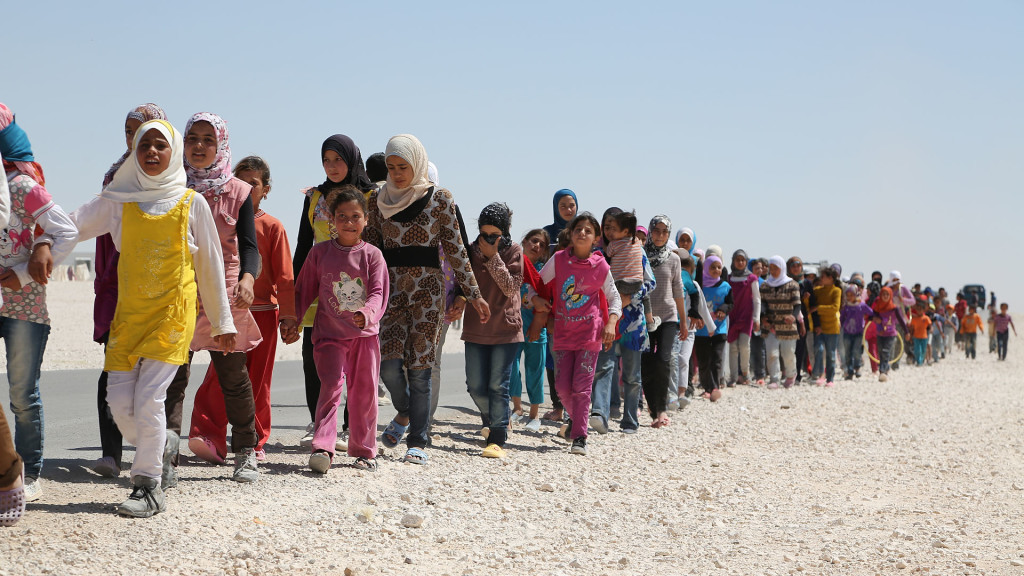
The first lesson you learn in Economics 101 is that people respond to incentives. Whether we’re talking about insurance, welfare, or hiring a new employee–incentives matter. That doesn’t change when we start talking about immigration or the refugee situation in the Middle East. Right now the incentives involved in the migration and refugee problem do not align with the stated goal of creating a stable region and minimizing human rights atrocities. I recently returned from a business trip to Turkey, from where millions of refugees have fled in the last several years into Greece and other members of the European Union (EU). Today an arrangement between Turkey and the EU went into effect, sending more than 200 people back to Turkey from Greece, in an effort to stem the flow the wave migrants and refugees that has begun choking the EU in recent years. Under the agreement, for every certified Syrian refugee sent to Turkey, one must also be sent for permanent settlement in the EU. Of the migrants sent back to Turkey today, not a single one was a Syrian refugee. The EU, Turkey, and Greece can contemplate how to halt the flow of migrants all they want, but it will not work until those nations, with backup from the United States, stop incentivizing bad behavior and empower Turkey and Syria to take matters into their own hands. The acceptance of hundreds of thousands, even millions, of refugees has allowed ISIS, with its relatively small fighting force, to gain a significant foothold in Syria—and they’re moving toward Turkey. Much how the United States’ immigration policy, or lack thereof, of allowing illegal immigrants to collect benefits and stay in the country with little or no negative ramifications has encouraged illegal immigration and stifled legal immigration, not incentivizing Syrians and Turks to stay and fight for their own nations will leave a negative impact across the globe. In Hamburg, Germany, for example, there are three Immigration camps which have effectively taken over those portions of the city. The police are reportedly not allowed to go into those portions of the city, and German citizens are leaving their homeland at a rapid rate. They feel their homeland has been taken over and do not feel safe. We are not going to stop the mass exodus of refugees without fixing the underlying tensions and problems. Simply shuffling refugees around the globe without a plan to require the Syrian and Turkish people to take responsibility for their land will only worsen the problem. After all, if a massive amount of people want to come to the United States because it is the land of opportunity, then why would we are only further incentivizing Syrians to flee their country by giving them a fast-track option through declaring refugee status. Syria is just one troubled area. There are an estimated 60 million refugees worldwide who are displaced from their homes. Europe is getting refugees from Libya, Algeria, Tunisia, and other North African countries, all displaced due to insecurity in their homeland. Whether the refugees are here in the United States, in the EU, or in Turkey, all of this insecurity, from the Middle East to Africa, can be credited to the Global Jihad Movement. The world must first recognize the Global Jihad Movement, then strengthen its resolve to destroy it. This effort must be led by Arab countries. Arab countries must take the lead in ridding the world of this radical ideology. For the U.S. to continue to meddle in the Middle East without Arab leadership is only to embolden Jihadist into fighting against an invading force. Politics aside, we may be divided on economic and social policy, as a world, we must unite to protect our way of life. The atrocities of Belgium and Paris are a mere body of water away. • • • Jonathan McConnell is the owner of Meridian Global Consulting, LLC, a maritime security firm, a Marine, and a former Republican U.S. Senate candidate.
Joe Biden to meet with leaders in Turkey mid-January
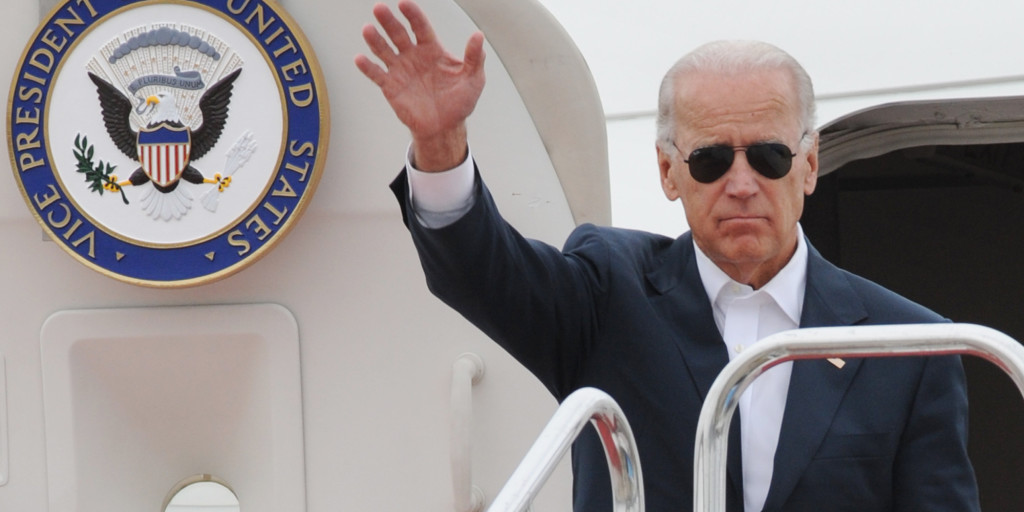
Vice President Joe Biden will travel to Turkey next month amid the ongoing fight against the Islamic State group. Biden is adding a stop in Turkey to his previously announced trip to Davos, Switzerland, for the World Economic Forum the week of Jan. 17. The White House says Biden will meet with Turkish President Recep Tayyip Erdogan (REH’-jehp TY’-ihp UR’-doh-wahn) and Prime Minister Ahmet Davutoglu (AH’-meht dah-voot-OH’-loo). The U.S. is pressing Turkey to do more to fight IS and tighten its border with Syria. Turkey has been a target of IS attacks, and on Wednesday detained two suspected IS militants believed to be planning suicide attacks. Biden is also working to tamp down a spat between Turkey and Iraq over Turkish troops staged at a training camp in northern Iraq. The White House says Biden will also visit Guatemala on Jan. 14 to lead the U.S. delegation to incoming President Jimmy Morales‘ inauguration. Republished with permission of the Associated Press.
Conservative dissent against Obama refugee resettlement plan continues to mount
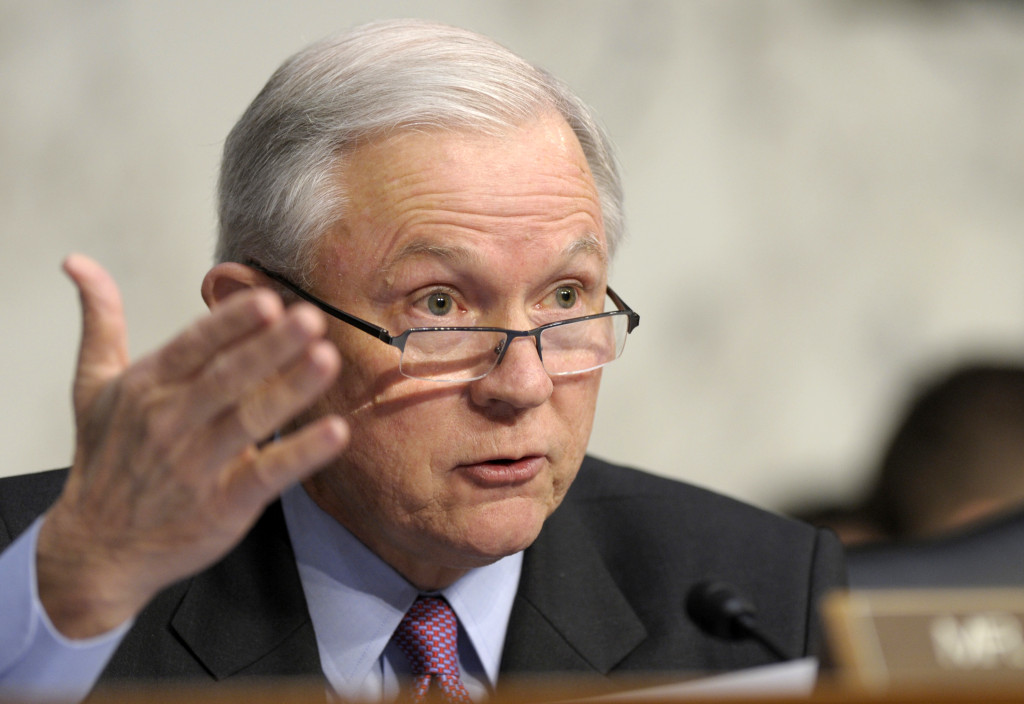
As President Barack Obama continues to seek public support for yet another controversial foreign policy initiative, in Alabama, his plan to raise the cap on refugees allowed into the country is instead garnering stern reproach from elected officials. The president, via Secretary of State John Kerry, recently rolled out a plan to gradually increase the annual cap on refugees allowed into the country from foreign soil to 100,000, up from 70,000 today. Alabama’s junior senator Sen. Jeff Sessions, on Monday took to the rostrum in the Capitol to excoriate Obama’s plan, saying the U.S. had already taken in some 1.5 million immigrants from Muslim nations since the attacks of September 11 and that given our federal deficit, that is plenty for the time being. “The U.S. has already taken in four times more immigrants than any other nation on Earth. Our foreign-born population share is set to break every known historical record,” inveighed Sessions. “Ninety percent of recent refugees from the Middle East living in our country are receiving food stamps and approximately 70 percent are receiving free healthcare and cash welfare. All of the nearly 200,000 refugees the Administration is planning to bring over the next two years would be entitled to these same benefits the moment they arrive.” “Since we are running huge deficits, every penny of these billions in costs will have to be borrowed and added to the debt,” Sessions added. He is far from alone in his opposition, especially among fellow southern Republicans. Congressman Bradley Byrne on Tuesday issued an announcement detailing his recent letter to the State Department citing concerns – echoed by Sessions and conservative columnist Rich Lowry in Monday’s New York Post among others – surrounding the nation’s limited capacity for vetting the incoming refugees. “Terrorist groups have made clear they intend to use the refugee process to infiltrate our country, and I have serious concerns about increasing the number of allowed refugees,” wrote Byrne in a letter to the department’s Bureau of Population, Rufugees, and Migration. So far, the U.S. has only accepted 1,500 refugees from Syria since the civil conflict began there four years ago. Millions have been displaced, largely looking to resettle in Turkey – which has taken in some 2 million Syrian refugees – or in continental Europe. Germany for instance, expects to take in up to 1 million refugees this year. The U.S. announced plans earlier this week to contribute some $419 million in aid to European and Middle Eastern countries which have taken the brunt of the mass exodus out of war-torn Syria.


